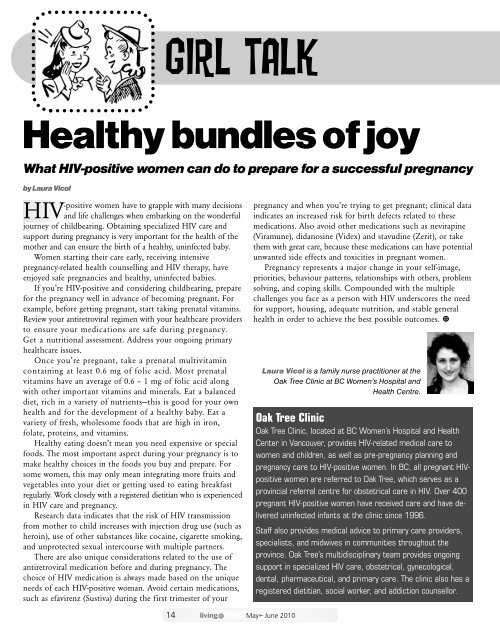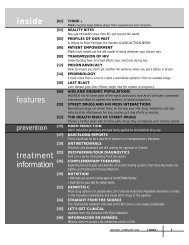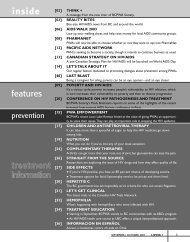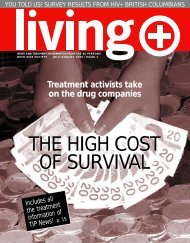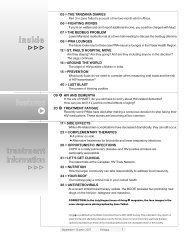liv poz mag.qxd - Positive Living BC
liv poz mag.qxd - Positive Living BC
liv poz mag.qxd - Positive Living BC
Create successful ePaper yourself
Turn your PDF publications into a flip-book with our unique Google optimized e-Paper software.
Girl Talk<br />
Healthy bundles of joy<br />
What HIV-positive women can do to prepare for a successful pregnancy<br />
by Laura Vicol<br />
-positive women have to grapple with many decisions<br />
HIVand life challenges when embarking on the wonderful<br />
journey of childbearing. Obtaining specialized HIV care and<br />
support during pregnancy is very important for the health of the<br />
mother and can ensure the birth of a healthy, uninfected baby.<br />
Women starting their care early, receiving intensive<br />
pregnancy-related health counselling and HIV therapy, have<br />
enjoyed safe pregnancies and healthy, uninfected babies.<br />
If you’re HIV-positive and considering childbearing, prepare<br />
for the pregnancy well in advance of becoming pregnant. For<br />
example, before getting pregnant, start taking prenatal vitamins.<br />
Review your antiretroviral regimen with your healthcare providers<br />
to ensure your medications are safe during pregnancy.<br />
Get a nutritional assessment. Address your ongoing primary<br />
healthcare issues.<br />
Once you’re pregnant, take a prenatal multivitamin<br />
containing at least 0.6 mg of folic acid. Most prenatal<br />
vitamins have an average of 0.6 – 1 mg of folic acid along<br />
with other important vitamins and minerals. Eat a balanced<br />
diet, rich in a variety of nutrients—this is good for your own<br />
health and for the development of a healthy baby. Eat a<br />
variety of fresh, wholesome foods that are high in iron,<br />
folate, proteins, and vitamins.<br />
Healthy eating doesn’t mean you need expensive or special<br />
foods. The most important aspect during your pregnancy is to<br />
make healthy choices in the foods you buy and prepare. For<br />
some women, this may only mean integrating more fruits and<br />
vegetables into your diet or getting used to eating breakfast<br />
regularly. Work closely with a registered dietitian who is experienced<br />
in HIV care and pregnancy.<br />
Research data indicates that the risk of HIV transmission<br />
from mother to child increases with injection drug use (such as<br />
heroin), use of other substances like cocaine, cigarette smoking,<br />
and unprotected sexual intercourse with multiple partners.<br />
There are also unique considerations related to the use of<br />
antiretroviral medication before and during pregnancy. The<br />
choice of HIV medication is always made based on the unique<br />
needs of each HIV-positive woman. Avoid certain medications,<br />
such as efavirenz (Sustiva) during the first trimester of your<br />
pregnancy and when you’re trying to get pregnant; clinical data<br />
indicates an increased risk for birth defects related to these<br />
medications. Also avoid other medications such as nevirapine<br />
(Viramune), didanosine (Videx) and stavudine (Zerit), or take<br />
them with great care, because these medications can have potential<br />
unwanted side effects and toxicities in pregnant women.<br />
Pregnancy represents a major change in your self-i<strong>mag</strong>e,<br />
priorities, behaviour patterns, relationships with others, problem<br />
solving, and coping skills. Compounded with the multiple<br />
challenges you face as a person with HIV underscores the need<br />
for support, housing, adequate nutrition, and stable general<br />
health in order to achieve the best possible outcomes. 5<br />
Laura Vicol is a family nurse practitioner at the<br />
Oak Tree Clinic at <strong>BC</strong> Women’s Hospital and<br />
Health Centre.<br />
Oak Tree Clinic<br />
Oak Tree Clinic, located at <strong>BC</strong> Women’s Hospital and Health<br />
Center in Vancouver, provides HIV-related medical care to<br />
women and children, as well as pre-pregnancy planning and<br />
pregnancy care to HIV-positive women. In <strong>BC</strong>, all pregnant HIVpositive<br />
women are referred to Oak Tree, which serves as a<br />
provincial referral centre for obstetrical care in HIV. Over 400<br />
pregnant HIV-positive women have received care and have de<strong>liv</strong>ered<br />
uninfected infants at the clinic since 1996.<br />
Staff also provides medical advice to primary care providers,<br />
specialists, and midwives in communities throughout the<br />
province. Oak Tree’s multidisciplinary team provides ongoing<br />
support in specialized HIV care, obstetrical, gynecological,<br />
dental, pharmaceutical, and primary care. The clinic also has a<br />
registered dietitian, social worker, and addiction counsellor.<br />
14 <strong>liv</strong>ing5 MayqJune 2010


